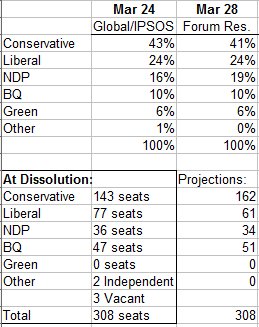So far, the opposition hasn’t been able to make much headway against that strong Conservative lead:

Here’s a summary from Kathryn Blaze Carlson:
The first poll since Saturday’s election call shows Tory support largely unchanged, bringing into question the opposition’s early emphasis on ethics.
Despite a weekend of being hammered for their alleged contempt of Parliament, the Conservatives boast the support of 41% of decided voters — 17 points ahead of the Liberals, who are at 24%. The NDP is at 19%, and the Bloc 10%.
The Forum Research poll also breaks it down by seat count, suggesting that if the election were held today, the Tories would surge from 143 seats to 162 seats, the Liberals would drop 17 seats to 61, the Bloc would rise from 44 to 51 and the NDP would be whittled from 36 seats to 34. The poll, conducted over the weekend via telephone with a random sample of 2,095 voters, is within the range of approximately plus or minus 10 seats for each party.
The seat projections reflect the regional strength of the BQ, who only run candidates in Quebec, and the natural disproportion of first-past-the-post voting.
Update: Publius points out the real root of Canada’s election issues:
Unfortunately neither you, nor any of the party leaders, have the temerity to admit what is actually wrong with Ottawa. Let me give you a hint. It’s not Stephen Harper’s pragmatism. It isn’t Lord Iggy’s incompetence. Not even Jack Layton’s spend till you’re broke ideology. The problem with Ottawa is Quebec. Gilles Duceppe and the Bloc Quebecois are merely the symptoms. Our national democracy is broken because part of the electorate refuses to participate.
In the 2006 and 2008 federal elections there were 308 seats up for grabs. That’s 75 in Quebec and 233 in the Rest of Canada (ROC). The 2006 election saw the Conservatives win 114 seats in ROC and 10 in Quebec. The Conservatives did better in the ROC in 2008 winning 133 seats and holding on to their seats in Quebec. If we were to remove Quebec’s 75 seats from Parliament a majority government could be formed with 117 seats. On that basis, including only their ROC seats, the Harper Tories would have won a strong minority government in 2006 and a clear majority in 2008. To say, as the opposition parties and the MSM have, that Harper has failed to seal the deal with Canadians is only partially correct.
For all his faults, chronicled in some detail on this blog over the years, Stephen Harper has in fact convinced a critical mass of the interested Canadian electorate of his fitness to lead us. Those who vote for the Bloc Quebecois have declared their disinterest in Canada as a working proposition.
The Bloc Quebecois are not political party in any meaningful sense but merely a pressure group that has won election to parliament. It is because of this we find ourselves in a series of weak hung parliaments. The BQ offers no vision for Canada, only its potential destruction. It’s bargaining position with the other parties in recent parliaments has been of routine blackmail. Vote what is in the best interests of Quebec, or else.




There is an easy solution to the regional problem. Force parties to run in all provinces and all ridings. If they cannot field candidates in, lets say, 75% of the ridings across all provinces and territories then they are not allowed to run any candidates at all. Either that or have them all declared independent, and not fund them at all. I have a hard enough time swallowing the fact that the Green party actually gets money from the taxpayer with zero elected officials, but at least they run candidates in all (most) ridings.
Comment by Dwayne — March 28, 2011 @ 23:25
I disagree on the idea of forcing parties to run in all ridings, but I’d love to see the funding for candidates scrapped. The argument for paying parties and their candidates a subsidy based on vote totals in the previous election is that it allows less wealthy groups and individuals a full say in the electoral process. The problem with it is that it entrenches the extant “major” parties in a way that makes it very, very difficult for new parties or independent candidates to compete . . . unless they’re wealthy.
Quebec is over-represented in the House of Commons, and that’s part of the constitution. Changing it will take us back to those agonizing days of the “Charlatan Conference”, “Leech Lake”, or worse.
Comment by Nicholas — March 29, 2011 @ 08:41
A true Federal party has no problem running candidates in the interest of Canada. Through all these years we are encouraging regional rumps to form, I am truly surprised that we haven’t seem more of them.
The only way to cut the Bloc off of the federal tit, the tit that they so want to leave (so they say) is to force them to run a national campaign. I mean, let’s be honest, it’s been 20 years since they stood up (well, Bouchard had a little help standing) and they have not accomplished their goal of separation, but they have accomplished their goal of extortion.
Comment by Dwayne — March 29, 2011 @ 20:22